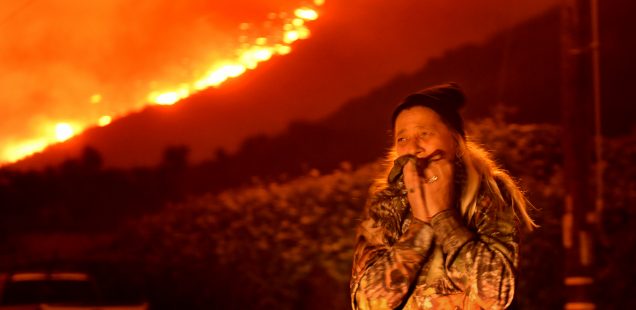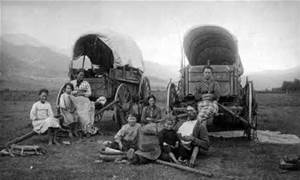
My Cousin in California
On November 9th, two weeks after my cousin in Pittsburgh, in her post-shooting gloom, bowed out of all social media, my cousin in California posted a short, all caps message on her Facebook page: WESTLAKE VILLAGE IS UNDER MANDATORY EVACUATION. EVERYONE NEEDS TO GET OUT.
The Woolsey fire to the west of Los Angeles was bearing down on her neighborhood.
It was my sister who alerted me to my cousin’s Facebook post, my sister who lives hours to the north in Livermore, forty minutes east of San Francisco. My sister’s neighborhood wasn’t under an evacuation order. She had no fires racing over the brown, tinder-dry hills toward her house, but over the next few days it did become increasingly difficult for her to breath. The smoke plume from the Camp Fire that was burning to the north in Butte County had engulfed San Francisco in a miasmic cloud of pollutants while up in Sacramento, where my sister’s daughter, my niece, goes to college, the California State University at Sacramento was closed as were most other schools and businesses.
California in late autumn of 2018. The Golden State. The state everyone moved to to live the healthy outdoor life now has vast scars of devastation blackening the land and some of the most polluted air in the country.
All anyone could say about it, anyone who knew what they were talking about, was that this would most likely be the new normal. More and more people were living in areas where they hadn’t before, the forests were tinder dry, and even when there was a lot of rain for a period of time, all it did was make the underbrush grow so when it dried out again there was more of it to burn. Dark, polluted skies, people living in tent cities combined with the reality that at least a hundred people burned to death in their houses or their cars. How many animals, both wild and domestic, were consumed is unknowable, but their last panicked moments don’t bear thinking about either.
Our leader, the denier-in-chief, went out to view the devastation and came out with one of his usual mind-bogglingly foolish remarks. We should rake the forests the way they do in Finland where they don’t have problems with fires. While it’s true the Finns have a lot of forests and not many problems with forest fires, I can tell you it isn’t because they’re out there raking. I’ve spent quite a bit of time in Finnish forests, hiking, picking berries, and even chasing cows who escaped the confines of their field one night and I can tell you that Finnish forests are generally pretty boggy places. Though a change in climate could dry them up, too, as their neighbors in Sweden found out last summer when fires raced through their forests and the skies over Sweden grew as dark and menacing as they were in California.
Those dark, evil skies my mother grew up under in Pittsburgh, the skies she ultimately escaped but that haunted her for the rest of her life, stretched over her daughter and niece and granddaughter last month out in California. People in San Francisco and Sacramento walked around with masks over their faces the way my mother and her cousins used to walk to school with handkerchiefs pressed to their mouths in the 1920’s and 30’s. Man-made environmental poison, intentionally spewed up into the air in the old steel-town of Pittsburgh, unintentionally released in California last month as the materials and contents of the vehicles and buildings vaporized into the air.
I wonder what my mother would have thought of that, or would the irony of it have escaped her? I wonder what we can do about it?
It struck me while the fires were burning and after they were finally contained that no one seemed to know what to do. Or they knew, but didn’t believe that any of the things that might stop forest fires would be done. People, a local journalist told The News Hour, will continue to move inland with property on the Pacific coast prohibitively expensive. California will continue to get drier due to global warming. He was being interviewed from his home via Skype. He was tired and looked a little weepy, or maybe his eyes were irritated from all the smoke in the air. In any case, there was a lethargic fatalism to his words. As if he didn’t think there was anything we could do to save ourselves.
Of course, there are many things we can do to save ourselves, but will we do them? That’s the question. A lot of the things we need to do come under the heading of restriction. We need to stop doing a lot of things the way we’ve been doing them up to now, or do less of them. Nobody wants to restrict themselves, or to be restricted for their own good, certainly not Americans. We want to go where we want to go and do what we want to do: live in the middle of a forest where the electrical lines connecting our house to the comforts of modernity might spark and start a fire that consumes it and hundreds of others, or live on the beach in a house on stilts that will wash away when the next big storm comes through.
As it happened, my cousin in California’s house and neighborhood didn’t burn. She and her family returned safe and sound after several days, but what about the next time? Will she be so lucky? What if it’s my sister or niece who have to flee?
Restriction, retreat (from the forests and the coasts). None of that sounds very appealing, does it? You only retreat when all is lost, when half your army is dead or dying, when there’s no possible way to fight on. But do we want to wait that long? Do we want to wait until half of us are dead and the other half are crawling out of the mud on our hands and knees? Or do we want to execute what there is a long and respected tradition in the military of doing: beating a tactical retreat? To avoid a battle you can’t win. To save your strength and resources for the longer war.
Which we might not win either. Which it’s looking increasingly like we won’t. Certainly not with the present administration casting what few environmental regulations we have to the wind, certainly not by our government pulling out of every international climate agreement (insufficient as they were), and calling the science of global warming a lie. We need better leaders, but we too need to be better. We need to be adults and learn to live with less. How’s that for a political message? I remember during the oil crisis when Jimmy Carter told Americans they might have to turn the heat down and put on a sweater. He lost the next election.
But maybe times have changed. Maybe. Maybe the next president will believe in science and have the courage to say so. The usual objection to the science of global warming and the call for more environmental regulation is that it’s a job-killer, but it seems to me that a lot of jobs got burned up in California last month. Apparently, not regulating the environment is a job killer, too. And a people and animal killer. And a community destroyer. All those things we say we hold dear.
Can the human race be proactive and save itself? Gosh, I hope so. Because this isn’t an abstraction anymore. It’s happening now. It’s happening to us all.





I couldn’t agree more, Linda.
Nailed it.
And, I just moved out here.
And after the fires, then we have the rain, and the mudslides.
Linda,
As always, a thoughtful, well written article on subjects that matter.
Keep writing please!
Rita
I will!
Well done, as always We are decades late in waking up to our climate reality, and we’ve passed the point of turning back the tide of clmate change, so retreat and mitigation are the only sane and adult responses.
Thanks.